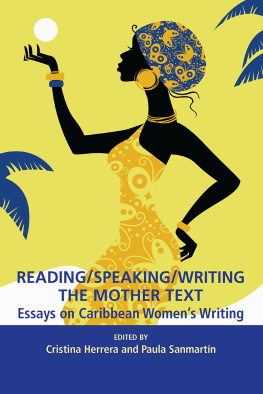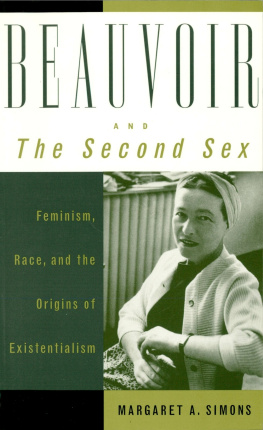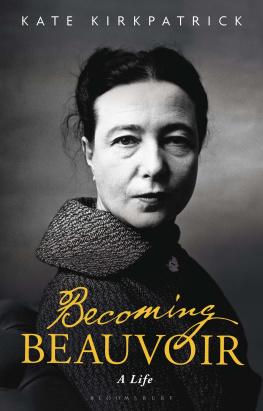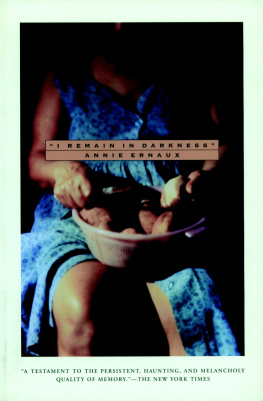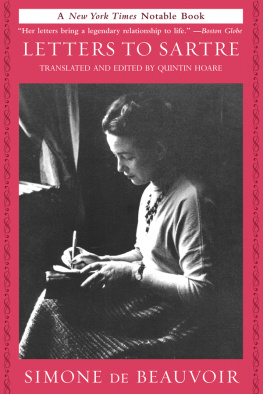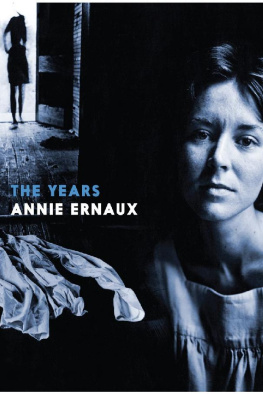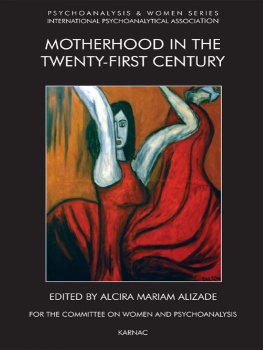
LIBERTY, EQUALITY, MATERNITY
IN
BEAUVOIR, LEDUC AND ERNAUX
The European Humanities Research Centre
UNIVERSITY OF OXFORD
The European Humanities Research Centre of the University of Oxford organizes a range of academic activities, including conferences and workshops, and publishes scholarly works under its own imprint, LEGENDA. Within Oxford, the EHRC bridges, at the research level, the main humanities faculties: Modern Languages, English, Modern History, Classics and Philosophy, Music and Theology. The Centre stimulates interdisciplinary research collaboration throughout these subject areas and provides an Oxford base for advanced researchers in the humanities.
The Centre's publishing programme focuses on making available the results of advanced research in medieval and modern languages and related interdisciplinary areas. An Editorial Board, whose members are drawn from across the British university system, covers the principal European languages. Titles currently include works on Arabic, Catalan, Chinese, English, French, German, Italian, Portuguese, Russian, Spanish and Yiddish literature. In addition, the EHRC co-publishes with the Society for French Studies, the Modern Humanities Research Association and the British Comparative Literature Association. The Centre also publishes a Special Lecture Series under the LEGENDA imprint, and a journal, Oxford German Studies.
Enquiries about the Centre's academic and publishing programme should be addressed to:
Professor Martin McLaughlin, Director
Further information:
Kareni Bannister, Senior Publications Officer
European Humanities Research Centre
University of Oxford
76 Woodstock Road, Oxford OX2 6LE
etiquiries@ehrc.ox.ac.uk
www.ehrc.ox.ac.uk
Legenda Editorial Board
Chairman
Professor Martin McLaughlin, Magdalen College
Editorial Adviser
Professor Malcolm Bowie, Christ's College, Cambridge
Professor Ian Maclean, All Souls College (French)
Professor Marian Hobson Jeanneret, Queen Mary University of London (French)
Professor Ritchie Robertson, St John's College (German)
Professor Lesley Sharpe, University of Bristol (German)
Dr Diego Zancani, Balliol College (Italian)
Professor David Robey, University of Reading (Italian)
Dr Stephen Parkinson, Linacre College (Portuguese)
Professor Helder Macedo, Kings College London (Portuguese)
Professor Gerald Smith, New College (Russian)
Professor David Shepherd, University of Sheffield (Russian)
Dr David Pattison, Magdalen College (Spanish)
Dr Alison Sinclair, Clare College, Cambridge (Spanish)
Professor Martin Maiden, Trinity College (Linguistics)
Professor Peter Matthews, St John's College, Cambridge (Linguistics)
Dr Elinor Shaffer, School of Advanced Study, London (Comparative Literature)
Professor Colin Davis, University of Warwick (Modern Literature, Film and Theory)
Senior Publications Officer
Kareni Bannister
Publications Officer
Dr Graham Nelson
LEGENDA
EUROPEAN HUMANITIES RESEARCH CENTRE
University of Oxford
Liberty, Equality, Maternity
in Beauvoir, Leduc and Ernaux
Alison S. Fell
First published 2003
Published by the European Humanities Research Centre of the University of Oxford 47 Wellington Square Oxford OX1 2JF
LEGENDA is the publications imprint of the European Humanities Research Centre
Published 2017 by Routledge
2 Park Square, Milton Park, Abingdon, Oxon OX14 4RN
711 Third Avenue, New York, NY 10017, USA
Routledge is an imprint of the Taylor & Francis Group, an informa business
European Humanities Research Centre of the University of Oxford 2003
ISBN 13: 978-1-900755-73-3 (pbk)
All rights reserved. No part of this publication may be reproduced or disseminated or transmitted in any form or by any means, electronic, mechanical, photocopying, recording or otherwise, or stored in any retrieval system, or otherwise used in any manner whatsoever without the express permission of the copyright owner
British Library Cataloguing in Publication Data
A CIP catalogue record for this book is available from the British Library
LEGENDA series designed by Cox Design Partnership, Witney, Oxon
Chief Copy-Editor: Genevieve Hawkins
- DS, i Simone de Beauvoir, Le Deuxime Sexe, i
- DS, ii Simone de Beauvoir, Le Deuxime Sexe, ii
- M Simone de Beauvoir, Mmoires d'une jeune fille range
- MTD Simone de Beauvoir, Une mort trs douce
- FG Annie Ernaux, La Femme gele
- F Annie Ernaux, Une femme
- JNS Annie Ernaux, 'Je ne suis pas sortie de ma nuit'
- A Violette Leduc, L'Asphyxie
- B Violette Leduc, La Btarde
I would like to thank Alex Hughes for her unstinting encouragement and incisive comments, Belinda Cooke, Elizabeth Fallaize, Sarah Fishwick, Diana Holmes, Marie-Chantal Killeen, Paul Mitchell, Roger Pearson and Chris Tinker for their help and expertise, Simon Kitson, who advised me where to look for material on Vichy, the staff of the Bibliothque Marguerite Durand, Genevive Lheureux and Peter and Sally Mars for their hospitality in France, and the Department of French Studies at the University of Birmingham, and The Queen's College, Oxford for financial assistance. I would also like to acknowledge the support of my family, and of Paul Cooke, who has patiently engaged with my project. This book is dedicated to my grandmothers, Mary Louisa Fell and Hilda May Blakey.
Chapter 1
Writing Motherhood
In The Mother/Daughter Plot: Narrative, Psychoanalysis, Feminism (1989), Marianne Hirsch asks 'What is a mother? What is maternal?' Thus, despite its apparent straightforwardness, the question 'What is a mother?' can give rise to a complex array of possible answers.
It is equally difficult to clarify the differences between the related concepts of 'motherhood' and 'maternity'. Adrienne Rich makes a useful distinction in her study Of Woman Born (1977) in which she takes maternity to refer to women's (potential or realized) biological capacity to become mothers, and motherhood to refer to the institutionalization of prescribed rules and regulations by which the practice of mothering is carried out.physical welfare of the population, women's labour rights, ideas of nationhood, and the roles of nature and culture in the development of social and gender roles. The centrality of motherhood in such debates inevitably not only inflects the ways in which we think about the roles and importance of mothers, but also influences the ways in which authors represent mothers and motherchild relationships in their literary texts.
My primary focus in this study is twentieth-century French literary representations of motherhood, particularly in female-authored texts. In France, certain connotations of the terms mre and maternit have been fundamental in articulations of individual and national identity. Numerous French politicians, writers, artists and thinkers have positioned mothers as the custodians of that which they identify as 'Frenchness'. Motherhood, that is, is frequently envisaged as being inescapably bound up with the country's self-image and future prosperity. An obvious point of departure in an examination of a Catholic nation's understanding of motherhood is with representations of the Virgin Mary. As Marina Warner and Julia Kristeva have demonstrated, the Virgin has for centuries been the most enduring and powerful image of the mother in France. In the innumerable representations of the mother influenced by what Julia Kristeva has referred to as the 'cult' of the Virgin Mary, motherhood is presented as unsullied by sexuality; mothers are posited as sacred but not sexual.


